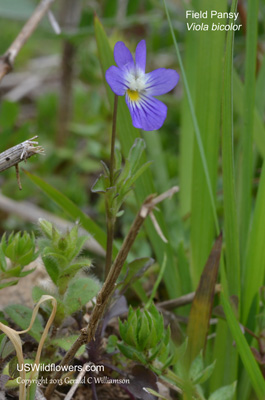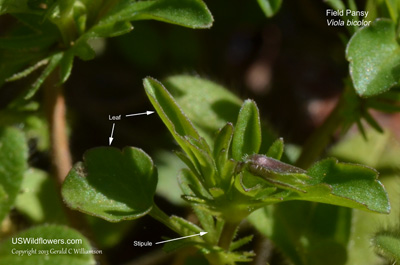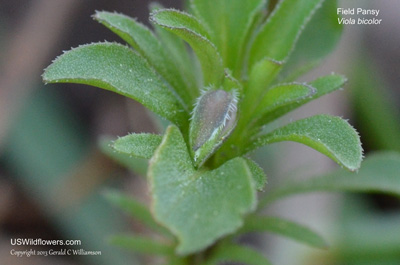Field Pansy, Wild Pansy, Johnny Jump-up - Viola bicolor
|
Viola bicolor - Field Pansy, Wild Pansy, Johnny Jump-up. Viola bicolor is still considered by some to be a variety of the European Viola kittaibeliana but most authorities now agree that it is a separate species native to the United States. It apparently was more common and originated in the western part of its current range, but due to its weedy nature it has spread eastward, and probably further westward than its original range as well.
Found in:
AL, AR, AZ, CO, DC, DE, FL, GA, IA, ID, IL, IN, KS, KY, LA, MA, MD, MI, MO, MS, NC, NE, NJ, NM, NY, OH, OK, PA, SC, SD, TN, TX, VA, WV
Leave comments on Viola bicolor at this link. | 
Distribution of Viola bicolor in the United States and Canada:

Blue=Native; Grey=Introduced
Map from USDA Plants Database:
USDA, NRCS. 2017. The PLANTS Database (http://plants.usda.gov, 08 May 2025). National Plant Data Team, Greensboro, NC 27401-4901 USA.
Search Our Database: Enter any portion of the Scientific, Common Name, or both.
Do a general Google search of the entire site:
#ad
 Follow USWildflowers on Twitter
| | Site: The Pocket at Pigeon Mountain, Walker County, GA Date: 2013-March-16 | Photographer: Gerald C. Williamson
Nikon D7000
Tamron SP 90MM f/2.8 AF Macro | | The blossoms are solitary arising from leaf axils on stalks that curve into a nod at the top. There are 5 petals, the lateral ones are bearded and the larger, lower one has a yellow patch at the base. All petals have dark veining. The petals are usually a pale blue, but may be white with a blue tint, as shown here. The petals of Viola arvensis are cream colored and Viola tricolor will have some dark blue on the upper petals. Probably the most reliable differentiator of Viola bicolor is the length of the sepals. The petals of Viola bicolor are distinctly longer than the sepals. The petals of Viola arvensis may be slightly shorter to slightly longer than the sepals, and the petals of Viola tricolor are shorter than the sepals. | | 
| | Site: The Pocket at Pigeon Mountain, Walker County, GA Date: 2013-March-29 | Photographer: Gerald C Williamson
Nikon D7000 | | The color of the blossom on this plant is more along the lines of what is "normal" for Viola bicolor. | | Click on the photo for a larger image

| | Site: The Pocket at Pigeon Mountain, Walker County, GA Date: 2013-March-16 | Photographer: Gerald C Williamson
Nikon D7000
Tamron SP 90MM f/2.8 AF Macro | | The lower leaves are more egg-shaped than the upper leaves, which narrow as they go up the stem. The leaves are on petioles, with the lower leaves being on longer petioles. The stipules are prominent, being leafy, deeply lobed, and the same color as the leaves. | | Click on the photo for a larger image

| | Site: The Pocket at Pigeon Mountain, Walker County, GA Date: 2013-March-16 | Photographer: Gerald C Williamson
Nikon D7000
Tamron SP 90MM f/2.8 AF Macro | | I’m not sure if this is a flower bud yet unopened, or if it is a cleistogamous flower, which are carried by Viola bicolor as well as most other species in Viola. These self-pollinating flowers which don’t open are reportedly more common in summer, and since this photo is from early in the spring season, it is probably an unopened bud, although the color might lend itself more toward cleistogamous. | | Click on the photo for a larger image

|
References used for identification and information:
|
|
| |
| #ad
|
|






